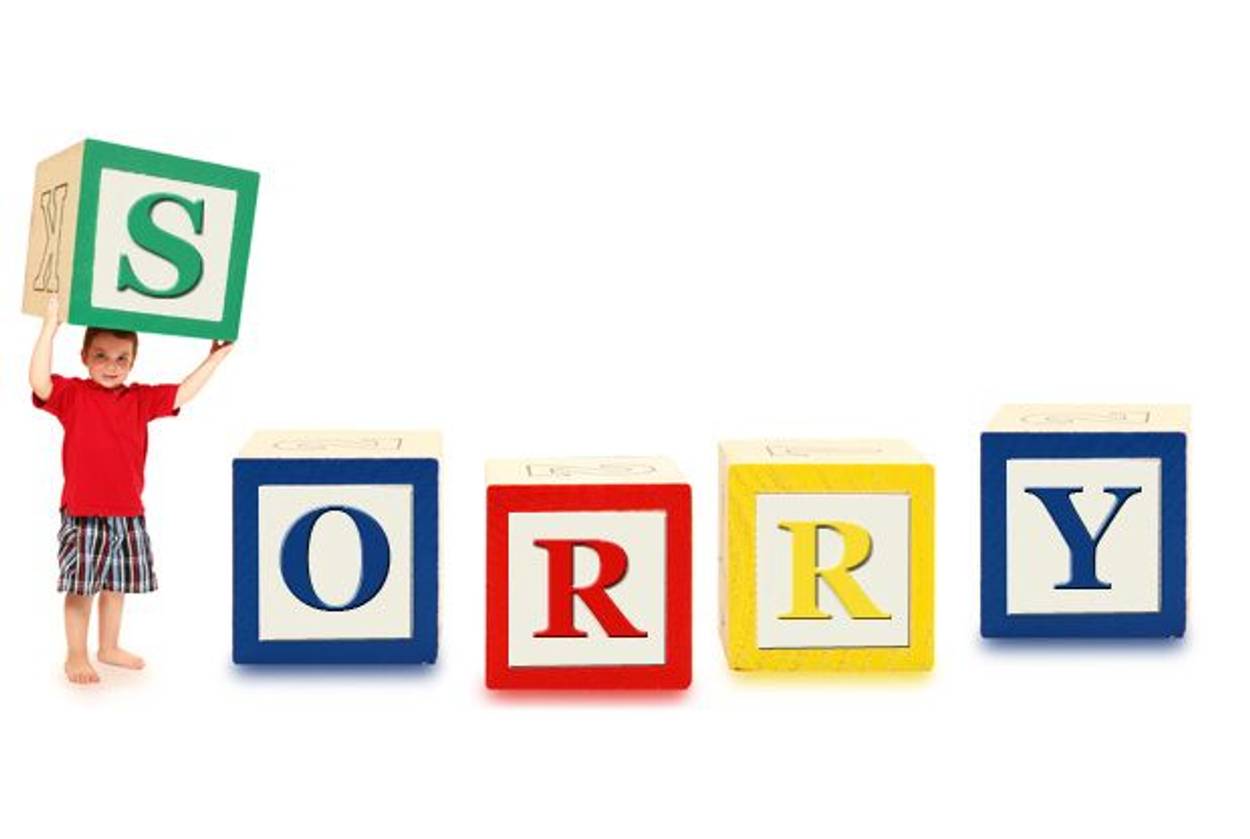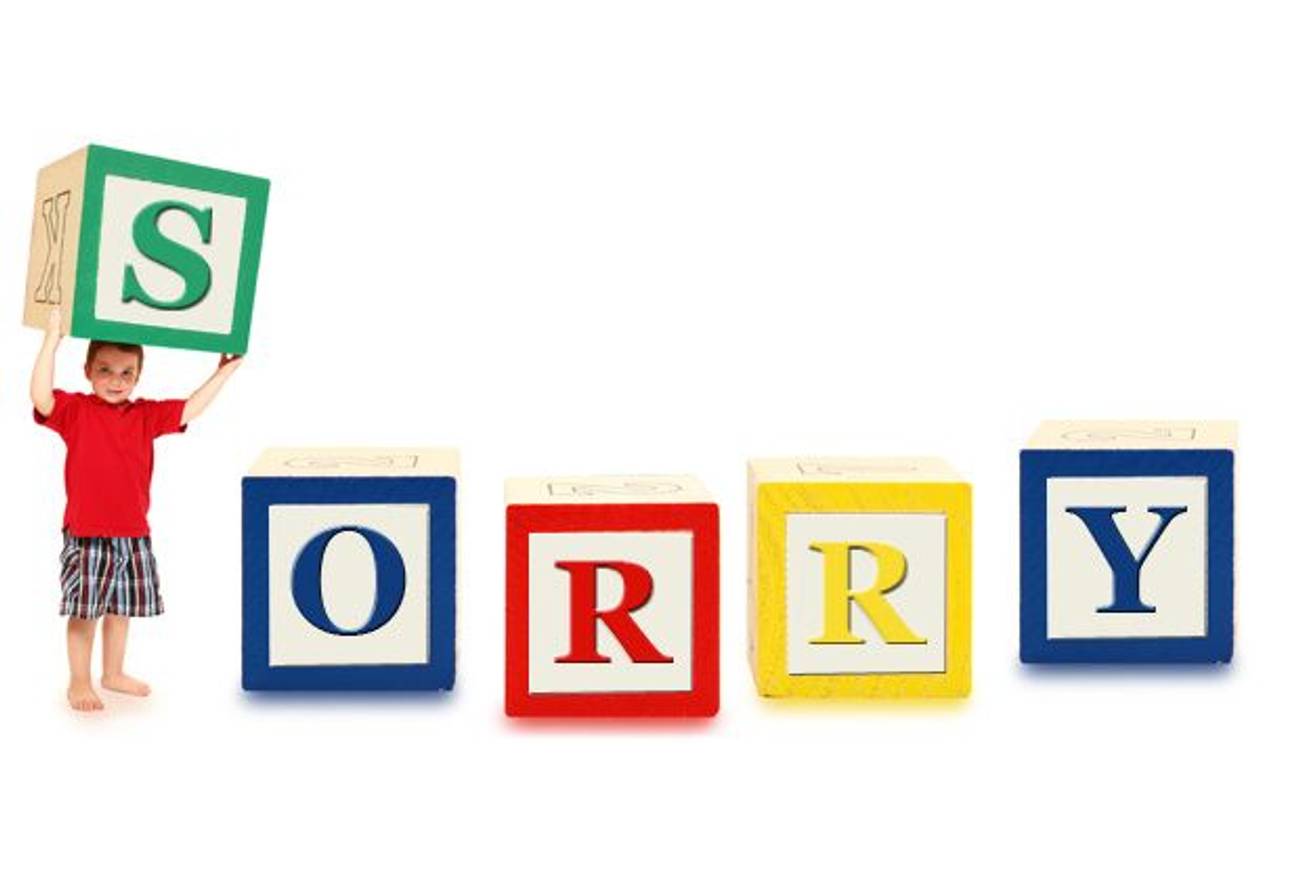Teaching Kids To Apologize
The High Holidays are the perfect time to instruct children in the art of saying ‘I’m sorry’—and meaning it




In an election year, it’s not easy to be your best self. Here we are, urging children to think about being moral and ethical, to consider the way we treat our fellow human beings, to inhabit the spirit of the Days of Awe, while our political leaders are metaphorically slapping the crap out of each other. It doesn’t help that this is also the month that most kids went back to school, causing adults to become more harpy-like than usual. We’re screaming at our children to go to sleep so they’ll be refreshed for school, hectoring them to stop dilly-dallying and get out the door in the mornings, noodging them to get into the habit of doing homework again.
So, the stretch of time from Rosh Hashanah to Yom Kippur is a great opportunity to hit the reset button—a chance for kids and parents alike to disengage from the quotidian world and focus on menschiness. As we adults start taking stock of our own behavior, asking forgiveness and apologizing for our misdeeds, it’s a good time to show our kids how to do the same thing. Teaching your kids to say “I’m sorry”—and perhaps even mean it—is no small task. But as some smart Jewish mensch once said, “If not now, when?”
Every Rosh Hashanah, my family participates in a Tashlich (“casting off”) ceremony, which involves throwing our sins into a body of water. Since sins are not corporeal or substantial (except, perhaps for that tribal-print padded-shoulder poly-elastane dress I bought for shul in a moment of dementia), we throw bread as representations of behavior we want to leave behind in the new year. In my family, we also do crafts, because I am just that kind of nerd. This year, we’re going to try something new: using my new favorite thing, food-safe markers (purchased last Hannukah for making edible dreidels a la my crafting idol, Bible Belt Balabusta) so we can write and illustrate our regrets directly on pieces of bread: “I didn’t include everybody.” “I don’t always do what I promise.” “I roll my eyes when I’m annoyed.” (That’s the regret I’ll be writing.) Then we’ll throw them into the river. The girls will no doubt wad each slice into a tight ball, staining their hands with food coloring that will not come out until at least Sukkot, a tangible reminder of the things they feel sorry about from the past year.
It’s a good idea to have some upbeat, fun activities planned, so your kids don’t think the High Holidays are only meant to make us feel bad about ourselves. Make apple prints for Rosh Hashanah and use them to create a cheat-sheet of blessings for your kids, as Bible Belt Balabusta suggests. Take your kids’ Harry Potter Lego mini-figs and make them tiny shofars out of Play-Doh, or little white kittels out of Kleenex. Think about mitzvah projects to do together between Rosh Hashanah and Yom Kippur: visiting an elderly relative, picking a charity to support as a family, making tzedakah boxes together. Read a creepy, scary holiday classic like Gershon’s Monster by Eric Kimmel (PJ Library has a terrific list of other Rosh Hashanah and Yom Kippur books for kids). Or make your own MadLibs with the Yom Kippur story of Jonah (“Jonah was swallowed by a [insert adjective here] fish”—hilarity ensues!). The possibilities are endless.
But once the games are over, if you want to keep discussing what it means to be sorry, there are two children’s poetry books that use William Carlos Williams’ poem “This Is Just To Say” (the one that starts “I have eaten/ the plums/ that were in/ the icebox”) as a jumping-off point for exploring apologies. You can glean lots of teachable moments from both. The more recent of the two, Forgive Me, I Meant To Do It: False Apology Poems by Gail Carson Levine (best known as the author of Ella Enchanted) takes a jokier approach. It’s full of poems, many purportedly by characters in fairy tales, nursery rhymes, and folk songs, expressing extremely insincere regret. For instance:
This Is Just To Say
I baked
a cottage
made all
of gingerbread
which
you and your sister
will be unable to resist
Forgive me
I am hungry
and I prefer my food
young
Levine points out that the original Williams poem involves a half-assed apology (the narrator is pretty self-justifying; dude, it doesn’t matter if the plums were so sweet and so cold! You knew she was saving them for breakfast!) and so are the snarky and passive-aggressive apologies in this volume. It’s a quick, fun read, appropriate for the season, and a great way to talk about what makes a lousy apology. (“I’m sorry I hit you, but you were being annoying” is bad; “I’m sorry I hit you; no matter how angry I was, getting physical was wrong” is better.
The other apology-poems book, This Is Just To Say: Poems of Apology and Forgiveness by Joyce Sidman (who won a Newbery Honor last year), is a masterpiece. I don’t use that word lightly. It’s for an older audience than the Levine book; adults will appreciate it as much as or more than kids, and children under 9 or 10 won’t get much out of it at all. The conceit is that a sixth-grade class has written apology poems with their teacher, Mrs. Merz. (All the poems are by Sidman.) The first half of the book consists of the apology poems; the second half is the poetic responses the kids get back when they give their poems to the people they’ve wronged (or when the wronged party is a statue or hamster or emotionally absent parent, another member of the school community crafts a response poem). It sounds more complicated than it is: a mix of poems both serious and hysterical, a portrait of a caring community, and a nuanced portrayal of how hard it can be to apologize and to forgive—delivered in a variety of poetic forms. I just read it for the seventh time and cried for the seventh time. (Hey, you try to resist an “I’m sorry” poem to a dog you’ve had to put to sleep, or a poem by a child who thinks her father abandoned the family because she cried too much as a baby.) But there’s hilarity here, too: a poem for two voices from two boys who are lethal dodge-ball ninjas is a delight.
The two books together made me think: What if we encouraged kids to write their own poems of apology? Many elementary-school-aged kids are obsessed with rhyming couplets and haiku (5-7-5! Who doesn’t love to count syllables?)—what a great way to apologize to those we’ve wronged. Our liturgy is full of acrostic poems (one we recite on Yom Kippur is the Ashamnu, a litany of sins in alphabetical order); why not ask kids to use the letters in their own names as the start of an acrostic poem about remorse and forgiveness?
This is an older-kid project, obviously. (Hey, I write what I know.) For very little kids, I think the most important Yom Kippur work is to be consistently prompted to say the words “I’m sorry.” I do not agree with the experts who say you shouldn’t make toddlers apologize if they don’t mean it; if you do your parenting job right, the expression of the sentiment ultimately leads to the actual feeling. But as kids get older, they should have an understanding of nuance: What if you still feel you’re the wronged party but want to use the spirit of the High Holidays to move on? What if you are truly sorry but do not expect to be forgiven? The Sidman book shows, rather than tells, how apologies don’t fix all wrongs, how sometimes forgiveness isn’t forthcoming, but how sometimes the admission of vulnerability and honesty can heal both sides. And right now, in the chaos that is my parental and political life, vulnerability and honesty sound awfully good.
Marjorie Ingall is a former columnist for Tablet, the author of Mamaleh Knows Best, and a frequent contributor to the New York Times Book Review.